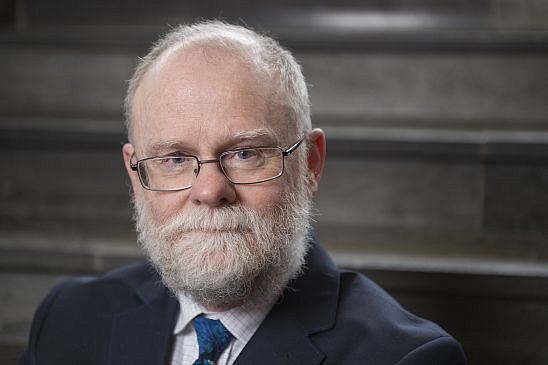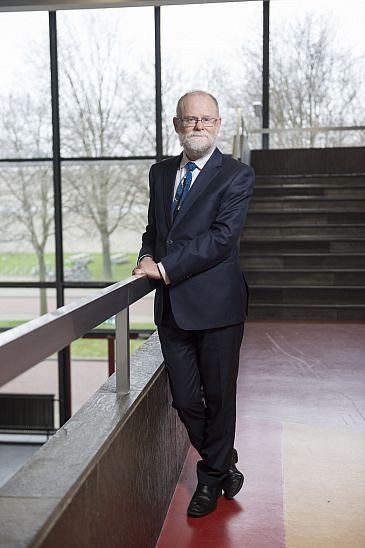John Schmitz, one of the founders of chip manufacturer NXP, has been Dean of the Faculty of Electrical Engineering, Mathematics and Computer Science since 1 March.
This article is a translation of the original interview in Dutch.
What brought you to Delft?
“I had a wonderful time at NXP. We were number one in chips for autonomous driving and I was one of the founders. Building something from the bottom up was a great experience. My responsibility was IP policy (intellectual property, Ed.). The role involves taking important decisions at the highest level. As much as 80% of the company’s value is in IP. But after working for more than three decades in the semiconductor industry, it was time for something new. Every year, I wonder what the next five years will bring. And what I will learn.
In the modern world, knowledge has become fleeting. You can look everything up on the internet. It is difficult to stay a step ahead. Here in Delft, there are people with knowledge and foresight. There are people working on the internet of things, on civil engineering and implantable chips. I find it amazing just walking around the campus here.”
Schmitz pauses for a second.
“There is another motivation. I have four children. One has already graduated and the other three are still studying. This has enabled me to see what life as a student is like today. I am convinced that, with my background, I can make a contribution to education, research and the Dutch knowledge economy.”
I can access your diary. On the morning of Wednesday 1 March, Menno came to install your docking station. Shortly afterwards, you visited the brainstorming day of the software technology research group leaders. And the day after that, you had an informal dinner with all the deans.
Schmitz laughs. “I keep nothing hidden. Everyone is free to know what I do. I published my first week on my blog. I am now being bombarded by a tsunami of people and information. After that, the strategic work will start. As dean, it is important to be open and visible. I will be holding an open hour once every week. Students will be able to drop in and say what is on their mind. My children have no idea who their dean is and what he does. They are studying in Nijmegen and Wageningen. I want it to be different here.”
What makes you suitable for this job?
“I know what you need to do to spark industry’s interest in research. How you can develop things that are of benefit to businesses, without neglecting fundamental research. Contract funding, from the world of business, is becoming increasingly important and is a good measure of the relevance of the applied research.”
What challenges do you feel you will face in the period ahead?
“The accommodation issue is an important point and is preoccupying people here. The faculty buildings are outdated. Energy and maintenance costs are high. EEMCS is vacating the high-rise section of building 36, but the low-rise will remain in use for the time being. We are currently exploring how we can adapt the former TNO building at Van Mourik Broekmanweg to meet the needs of our faculty and staff. Researchers in the applied mathematics, intelligent systems and software technology departments may relocate as early as the end of the year. The future of the high-rise building is uncertain. One of the options is total demolition.
Another key challenge is the growing number of students. It is becoming increasingly difficult to find sufficient lecture rooms. But it is a problem I can live with. Better that than falling student numbers. This faculty’s students are very much in demand. Electrical engineering, computer science and mathematics have become an essential part of our daily lives. They have a role to play in almost every issue in society, whether it is transport, healthcare or security. Businesses come here to discuss employment prospects even before students have graduated. We are clearly focusing on the right issues.”
Could you tell us some of the things that are likely to change?
“In the next few years, the Bachelor’s programmes will switch to English. I see that as a positive development. English is the working language of science and technology. I also predict that students will start taking online courses in preparation for lectures. A kind of mini-MOOCs. In 2018, we are also opening a new lab, the Lab for Social Data Science. With the advent of the internet of things, in which everything is linked to the net, data will have an important human component. To convert that mass of data into usable insights, you need social sciences combined with the technology we are developing here.”
You relocated to Delft from Mol in Belgium. Are you a bon vivant?
“There is more zest to life in Belgium than here. The Belgians love life, eating and drinking. But the real reason I lived in Mol is actually less interesting. I spent some time working for the IMEC research Institute in Leuven and for Phillips in Eindhoven. Mol is located exactly between the two.”
Mol is also famous for its nuclear reactor.
“Yes, Mol just radiates with delight.”
Before that, you were in the United States. What did you do there?
“I was based in Austin, Texas. Austin is the only liberal place in Texas. When you tell Texans that you live there, they view you with suspicion. The Rolling Stones came to perform there. Fantastic! I am a great fan. I represented Philips in the Sematech club, a consortium of chip makers. We designed new standards in lithography.”
And for NXP in Philips, you also managed the patents and licenses. What do you think of the University’s patents policy?
“TU Delft has more than 300 patents, I believe. I need to look into the IP policy. For a university, maintaining patents is not obvious and can be very expensive. Pursuing lawsuits is not something universities are eager to do. It costs millions. It is better to find an alternative approach; asking companies to take out a licence.”
How would you like to be remembered in five years’ time?
“I should begin by pointing out that I got off to a very good start. My predecessor, Rob Fastenau, did a great job and left the faculty in a wonderful condition. But that does not mean I can rest on my laurels. I hope people will remember me as the man who made the right choices. The resources we have are limited. We need to ensure that the money reaches the right places. To achieve that, I intend to make use of the brainpower of the whole organisation. A bottom-up approach always results in the best ideas and support. If a crew is motivated, you have already won half the battle.”
What areas of research are particularly promising?
“The internet of things. Of course, it is a very wide area. We need to explore where our sweet spots are. I think we are good at security. Currently, everything is being hacked. If that continues to happen, the internet of things will never work. The faculty has a lot of people who understand anti-hacking security. Blockchain is another important development. The faculty has been working on it for a long time and well before the significance of the technology really became clear. Blockchain is a digital cash book where all transactions go. It is designed to ensure that the system automatically prevents fraud or errors. Blockchain will become very important in logistics and the financial world. It can dramatically change the work of banks and make life difficult for hackers. Quantum computing also has great promise, of course. If it works, it will result in a revolution. If you compare a conventional computer with dynamite, quantum computing is the equivalent of a nuclear explosion.
Finally, you have microelectronics. We are developing chips that you can connect to neural pathways in the human body to enable people who are paralysed to move again. It involves sending a wireless signal from the brain to a chip in a paralysed limb, for example a leg, so that the chip brings movement to the leg muscles. We are also working on chips that mimic organs: organs on a chip. This will enable us to test the effect of medicines on organs. The years ahead will bring new developments that I cannot yet envisage.”
You are also a musician. Do you have time left to make music?
“I am busier than I used to be and my hobbies will suffer from that. I play saxophone in a big band and guitar in a combo. And I love sailing in the old gravel lakes around Roermond.”
 CV
CVCV
John Schmitz (Maastricht, 1954) studied Chemistry at the Radboud University in Nijmegen, where he was awarded his doctorate in 1984, specialising in thermodynamics and electrochemistry. Since then, he has had more than thirty years’ experience in the semiconductor industry at such companies as Philips, Genus Inc, Sematech and NXP. The practical application of technology has played an important role in his career: Schmitz has more than fifty publications and contributions in peer-reviewed journals and at international conferences to his name and has published books on semiconductor technology as well as a popular scientific work on thermodynamics. Schmitz also holds a total of six patents.



Comments are closed.